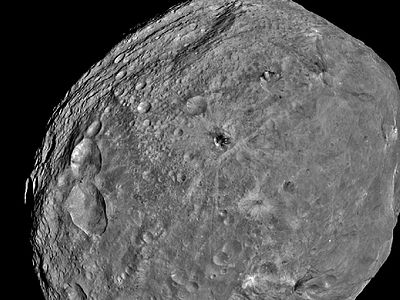
VOYAGES TO NEW WORLDS

Space exploration marches on, despite the
ending of the shuttle program, sadly making
America completely reliant on Russia for
manned launches, which has lost 6 launches in the last year, including one from the same family as the
manned missions. However, the SpaceX company
is just about to fly a private small but
6-man air-launched spacecraft that is supposed
to cost only 10% of the glutinous Shuttle
to launch. The Dawn spacecraft reached orbit
around Vesta July
16 (my brother had one of their scooters, no that's Vespa
http://en.wikipedia.org/wiki/Dawn_(spacecraft)),
the
second
biggest
asteroid
(330mi
diam),
the
thousands
of
rocks
between Mars and
Jupiter once thought remnants of a shattered planet. This is very
cool, there haven't been even close flybys of the big ones- they
look to be dead rocks, but since they date from very early Solar
System, they hold secrets of formation. It goes on to the biggest-
Ceres, 590 miles dia, round,
and with a
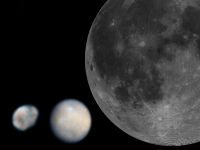 large amount of water ice, in Feb 2015.
And it is solar-panel ion powered, blowing off inert hot Xenon ions
in a very very slow acceleration that continually accumulates till
the sucker is blindingly fast- it can change its direction more than
any other spacecraft- 10km/s. I never even knew they were doing
this- the proposed ion propulsion of sci-fi/ DARPA always relied on
hot nuclear fuel as the heat source. They believe they have 200 samples
of Vesta in meteorites that were blasted off it in a massive impact a
billion years ago, but frankly I'm dubious they can really identify
that without landing there.
Vesta fm Dawn spacecraft in orbit
large amount of water ice, in Feb 2015.
And it is solar-panel ion powered, blowing off inert hot Xenon ions
in a very very slow acceleration that continually accumulates till
the sucker is blindingly fast- it can change its direction more than
any other spacecraft- 10km/s. I never even knew they were doing
this- the proposed ion propulsion of sci-fi/ DARPA always relied on
hot nuclear fuel as the heat source. They believe they have 200 samples
of Vesta in meteorites that were blasted off it in a massive impact a
billion years ago, but frankly I'm dubious they can really identify
that without landing there.
Vesta fm Dawn spacecraft in orbit
Vesta,
Ceres,
Moon
Then the Juno
spacecraft
(wife of Jupiter) bla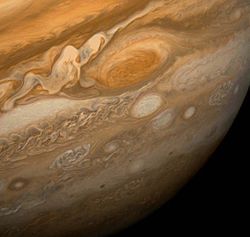 sted off Friday Aug 5 to orbit
Jupiter, the gas giant that could hold the rest of planets
inside 2 times over. Again its a
miserable long 5 year Earth flyby slingshot trajectory because we
don't have a single big booster, that invites radiation and
micrometeorite damage, which happened to the 1986 (1995-2003 orbit)
Galileo orbiter
spacecraft - the main dish antenna never opened
properly, forcing them to send everything back 1500 times slower on a
car radio-like antenna. But it is much more advanced spacecraft- in a
polar orbit for 15 months to study the huge magnetism and
radiation fields, analyze the mysterious cloud layers, detect a
believed rock core, metallic hydrogen mantle and
interior
layers, and
going as low as 2400 miles above the immense planet- the views
of the hurtling clouds will be spectacular (Jupiter rotates very fast-
10 hours, giving it an Equatorial rotation speed of 12.6kps, faster
than Earth's escape velocity),
and radiation searing.
This may be the lowest any orbiter has come to a planetary surface-
it may actually be dangerous to it if it hits high tendrils of
atmosphere (Jupiter flares?) that slow and crash it. But they're going
to do that anyway, after 15 months, to avoid
sted off Friday Aug 5 to orbit
Jupiter, the gas giant that could hold the rest of planets
inside 2 times over. Again its a
miserable long 5 year Earth flyby slingshot trajectory because we
don't have a single big booster, that invites radiation and
micrometeorite damage, which happened to the 1986 (1995-2003 orbit)
Galileo orbiter
spacecraft - the main dish antenna never opened
properly, forcing them to send everything back 1500 times slower on a
car radio-like antenna. But it is much more advanced spacecraft- in a
polar orbit for 15 months to study the huge magnetism and
radiation fields, analyze the mysterious cloud layers, detect a
believed rock core, metallic hydrogen mantle and
interior
layers, and
going as low as 2400 miles above the immense planet- the views
of the hurtling clouds will be spectacular (Jupiter rotates very fast-
10 hours, giving it an Equatorial rotation speed of 12.6kps, faster
than Earth's escape velocity),
and radiation searing.
This may be the lowest any orbiter has come to a planetary surface-
it may actually be dangerous to it if it hits high tendrils of
atmosphere (Jupiter flares?) that slow and crash it. But they're going
to do that anyway, after 15 months, to avoid 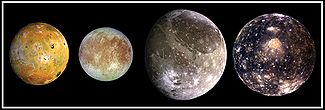 contaminating
the
planet-wide
ocean
of
Europa (let no man go to Europa!), like they did
with Galileo. The planned NASA/ESA orbiter of the alluring Europa is
now planned for 2020, but still no robot submarine to melt or blast
through the ice surface to the perhaps 60 mile deep ocean.
Why
this
isn't
a priority is a mystery. Jupiter,
with its incredible water
ocean + volcano covered 64 moons (18 substantial), 3000 mi thick
at
contaminating
the
planet-wide
ocean
of
Europa (let no man go to Europa!), like they did
with Galileo. The planned NASA/ESA orbiter of the alluring Europa is
now planned for 2020, but still no robot submarine to melt or blast
through the ice surface to the perhaps 60 mile deep ocean.
Why
this
isn't
a priority is a mystery. Jupiter,
with its incredible water
ocean + volcano covered 64 moons (18 substantial), 3000 mi thick
at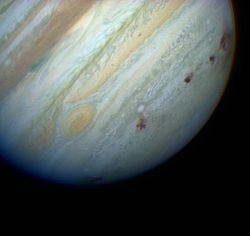 mosphere, massive radiation, 400 yo Red Spot,
and unfathomable cold/hot liquid/gas surface has more mysteries of
the universe than the other planets combined (see Aurthur C Clarke).
At $1.1 billion, this is a new major expedition that I thought NASA
had abandoned. Jovian moons, Io, Europa, Ganymede,
Callisto
mosphere, massive radiation, 400 yo Red Spot,
and unfathomable cold/hot liquid/gas surface has more mysteries of
the universe than the other planets combined (see Aurthur C Clarke).
At $1.1 billion, this is a new major expedition that I thought NASA
had abandoned. Jovian moons, Io, Europa, Ganymede,
Callisto
I watched the 6 impact blotches on the
great antique
big Brown refractor in '94 when the pieces of shattered comet
Shoemaker-Levy 9,
smashed into Jupiter at 36 mps. Unfortunately the impacts
were just over the Jovian horizon (not for Galileo) but the flashes of
the titanic
explosions were visible, each big enough to be an ELE on earth- a
mass extinction level event. Incredibly on a gas-liquid? surface the
multiple-Earth sized dark patches lasted 5-6 weeks.
Then
another rover is blasting off for Mars
Thanksgiving- thi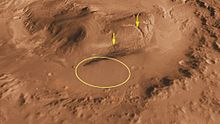 s one as big as a Mini-
s one as big as a Mini-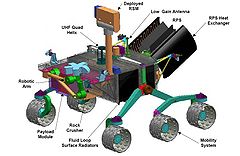 Cooper- Curiosity,
not
the mini-size Spirit + Opportunity Rovers that though built
for a 3 months life, lasted 7-8 years- the Opportunity just reached the
edge of a big crater! Mars_Science_Laboratory
This one
is specifically searching for habitable zones- has a huge range, and
going to land with retro-rockets (too heavy for balloon) stopping the
main spacecraft, and the rover lowered on a tether till it reaches
ground, cut the cable, then the main spacecraft will crash!!!! Duh,
couldn't they just land the damn thing- maybe artificial intelligence
still isn't up to the task- cause the light time delay (6-22 minutes)
prevents any live control of landings. Supposed to arrive in
exactly a year- Aug 6, 2012
Gale crater Mars landing site
Cooper- Curiosity,
not
the mini-size Spirit + Opportunity Rovers that though built
for a 3 months life, lasted 7-8 years- the Opportunity just reached the
edge of a big crater! Mars_Science_Laboratory
This one
is specifically searching for habitable zones- has a huge range, and
going to land with retro-rockets (too heavy for balloon) stopping the
main spacecraft, and the rover lowered on a tether till it reaches
ground, cut the cable, then the main spacecraft will crash!!!! Duh,
couldn't they just land the damn thing- maybe artificial intelligence
still isn't up to the task- cause the light time delay (6-22 minutes)
prevents any live control of landings. Supposed to arrive in
exactly a year- Aug 6, 2012
Gale crater Mars landing site
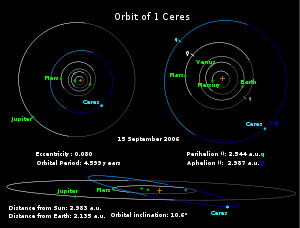
They finally discovered a TROJAN
asteroid dogging earth in a similar orbit, but 60% back-
they'd seen
them for all other big planets, but since they're so close to the
sun (from earth), they are only visible about 1/2 hour before + after
sunrise. It is about 130-300M diameter, but is in an unstable orbit
20% off of the plane of Earth's, so not a candidate for a pretty
simple manned mission. One of the neat things about orbital
mechanics, is if you want to go backward, you fire your rockets to
go away- faster, go into a higher and slower orbit, let the
trailer catch up, then fire retro rockets to slow and drop back into
the same orbit. Similarly to chase someone ahead in orbit, you fire
retro rockets. So every space movie is totally wrong.
Audio
of
NPR SCIENCE FRIDAY show
WONDERS
OF THE SUN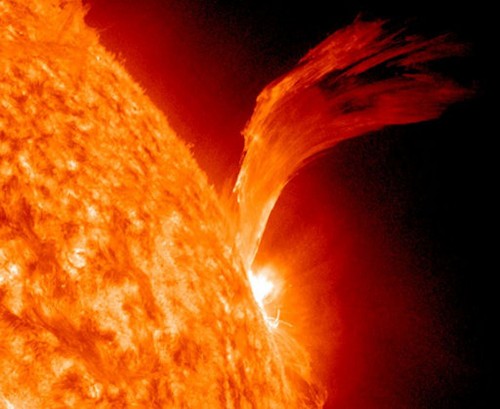
Then you must listen to this guy talk about the sun (NPR On Point), Bob Berman (The Sun's Heartbeat), the best science communicator I've ever heard. A big solar flare happened Thurs: check your 11-4am aurora's if you are up North. Among the treasure of fascinating facts, the sun has been steadily getting 10% hotter every billion years (as hotter elements burn in the core) so the very early Earth was 35% colder than now, but that was almost exactly compensated by the huge amount of greenhouse gases, That was always a question- why the early methane + CO2 soaked Earth wouldn't have been killingly hot, but it means Earth will be uninhabitably hot in 500, maybe 300 million years- and maybe all life will die (he said 700 degrees in a billion years-ow, ow). And 10 minutes of intense sunlight makes huge amounts of Vitamin D (200 glasses of milk)- some of our modern diseases (autism?) may be due to it's absence and current cancer paranoia. The strongest color in the sun is green, and plants actually hate it and reject (reflect) it, why they are green!! And a really huge solar storm/flare as bad as 1859 would fry most of the power/land phone networks of earth- luckily we should have 1-4 days warning from the STEREO + ACE satellites, though bizarre proton storms can travel 1/3 of light speeds, and arrive in 24 minutes!?? I toured the heliotelescope on Mauna Loa (at 11,000ft, the highest and biggest atmospheric laboratories- because of laminar airflow that sucks down the stratosphere- equivalent to 31,000ft, which happens to be real height of Big Is. mtn from the bottom of ocean, biggest + highest on Earth) with a 2M wide projected image of the sun, worked on the Subaru telescope on Mauna Kea (13,700ft), and toured 10 of the world's biggest telescopes in the world there- best space visibility on earth.
But
the really really bad news for people, maybe catastrophic in just 2-3
years, is that the Sun has been in an unprecedented solar minimum
(anybody hear about that?), the quietest and coolest in human record
(200 years) from 2006-2009- no sunspots at all for 800 days, but EVEN
WITH THAT, we had the hottest years in history, 2005 and 2010, when
the cooler Sun was perhaps negating 30-50% of global warming
(though there was a major solar eruption in July 2010). In the
Little Ice Age (1645-1750), the sunspots stopped and the
Thames and Venice froze over. The coming solar maximum, with maximum
sunspot activity and maximum heat output (11 year cycle max-min) is
forecast to be 2013-2015, which if it is intense may be when the first
Great Drought rips through the world. Texas everywhere.
Civilization
as we know it may itself be on a very fragile tether.
GAS
PRINCESS
IN
THE DOCK
 The contemptible prosecution of former
PM and near-President Yulia Tymoshenko
continues- the judge jailed her
Friday to the shock of the world- she was contemptuous but he earned
it, giving her new lawyers 2 days to review 5000 pages of charges.
Yanukovich isn't content to monopolize every power in the country-
being an ex-mugger convict he must destroy the opposition as an object
lesson to
any possible future challenge, as Putin did- that's what the
Khodorkovsky jailing was all about. The charges against her and fmr
Justice Min. Lutsenko are nonsense-
The contemptible prosecution of former
PM and near-President Yulia Tymoshenko
continues- the judge jailed her
Friday to the shock of the world- she was contemptuous but he earned
it, giving her new lawyers 2 days to review 5000 pages of charges.
Yanukovich isn't content to monopolize every power in the country-
being an ex-mugger convict he must destroy the opposition as an object
lesson to
any possible future challenge, as Putin did- that's what the
Khodorkovsky jailing was all about. The charges against her and fmr
Justice Min. Lutsenko are nonsense-
Tymoshenko demonstrator in front of court on Kreshchatuk
Yanukovich: "What's our life:
Caviar!" (play on TV show name)
no doubt she has done many
crooked things (all officials are on the take here, but the charges
concern
her simple official decisions that they are calling treason. Her
people, inc MP's have occupied the entire block in front of the
courthouse on busy Kreshatuk- they will violently
disperse them, I think. It has allied Yatsenuk, world boxing
champion Klitschko, and other
factions in
an anti-dictatorship alliance. But it will also scuttle Ukraine's
integration into Europe and may cripple the Euro 2012 soccer
games- a French group called on Euro officials to cancel Ukr
participation.
Michael Hammerschlag©2011
------------------------------------------------------------------------------------------------
Michael Hammerschlag has worked
on the top of Mauna Kea, seen 3 total solar eclipses, 3 lunar eclipses,
6 planets, 8 moons. 3 comets, assorted galaxies, a nighttime polar
shuttle launch from 3 mi., and will go into space when he has a spare
$20 million. He has written articles on the Titan Landing, Voyager
Missions, SETI project, and catastrophic planetary impacters.